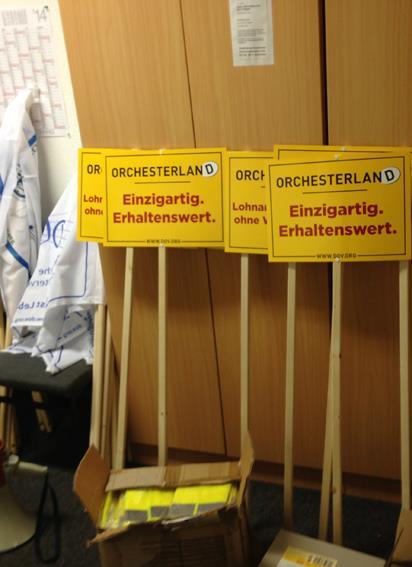
More than 100 orchestras in Germany staged a 24-hour strike on Monday 30 September. The largest such action in Germany since the 1950s, it was organised by the German Orchestra Union on the eve of salary negotiations with the German Stage Association (GSA), the body responsible for the payment of the musicians involved.
The union argues that, whereas other public servants have enjoyed an eight per cent salary increase since 2010, musicians’ salaries have remained static. ‘Since 2009 we have had a collective bargaining agreement that covers these 100 orchestras,’ explained union president Gerald Mertens. ‘It contains a clause stating that if public-sector workers receive a pay rise, orchestral musicians would get the same amount. However, there has been no pay rise for musicians for the past three years.
‘Initially we took our case to the local courts, then to the state courts. On 25 September the case was heard at the federal labour court in Erfurt, which ruled that we had no enforceable legal claim to a pay rise: instead we would have to bargain, and like other unions, we had the right to go on strike.’ According to the union, the salaries of around 8,500 musicians nationwide are affected by the provisions of the collective bargaining agreement.
In contrast, GSA managing director Rolf Bolwin indicated that it had been prepared to negotiate since 2010, but that the union had chosen to take its case through the courts instead. 'Other theatrical artists, such as dancers and actors, have had salary increases of around three per cent for the past three years,' he said. 'Now, an increase of eight per cent will be more difficult, as it's a more significant increase.' He also speculated that retroactive payments for musicians for 2010–13 could present another problem. Negotiations between the GSA and the union were scheduled for 1, 14 and 22 October.
The union has additionally been campaigning for Germany’s ‘orchestral landscape’ to be recognised by UNESCO as intangible cultural heritage. ‘In the past 20 years we have lost 37 orchestras, from an original total of 168,’ said Mertens. ‘We must make an end to the cuts to orchestras, and to musicians’ jobs, across Germany.’
Subscribe to The Strad or download our digital edition as part of a 30-day free trial.
Photo: courtesy German Orchestral Union































No comments yet